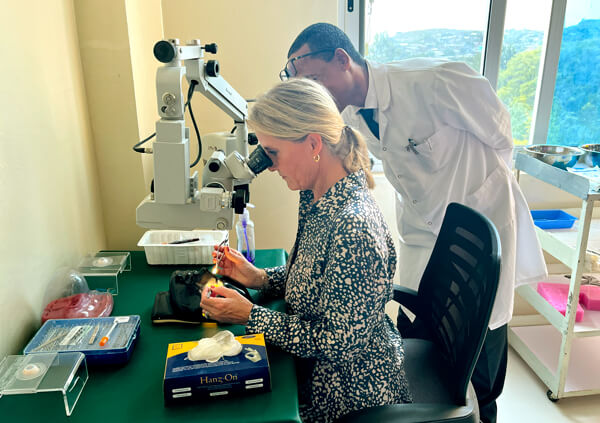Her Royal Highness The Duchess of Edinburgh, visited services protecting the vision of children and adults in Hawassa, Ethiopia, with international eyecare charity Orbis.
In her role as Global Ambassador for the International Agency for the Prevention of Blindness, The Duchess met health workers screening for and treating blinding trachoma at a primary eyecare unit. Here she learnt about the challenges people face which can lead to trachoma, including limited access to clean water and sanitation, and the work being undertaken to find and treat those with the condition, including training for case finders which she witnessed first-hand, and providing antibiotics and surgery.

Her Royal Highness meets with members of the community receiving screening for trachoma. Credit: Adam Mengistu
With repeated infections, this condition will cause a person’s eye lids to turn inwards, scrapping and damaging the surface with every painful blink. 70% of cases in Ethiopia impact women, who make up 70% or more of those receiving surgery for the advanced stage of this condition through Orbis programmes.
Her Royal Highness then visited a local school, to see how children are screened by teachers for many eye conditions, and where they learn about how to protect themselves from trachoma, through school eyecare clubs sharing the information through plays and songs. The early stage of the trachoma infection is most common in children ages 1–9. If they develop the condition, their education can be impacted without quick access to treatment.

HRH takes part in simulation training, focussing on cataract surgery. Credit: Orbis
Her Royal Highness then visited Hawassa Tertiary Eye Care unit, and was shown the simulation training opportunities available at the hospital, which were established by Orbis. With the use of uses virtual reality, and cutting-edge prosthetics, eyecare teams can build their skills and confidence safely before progressing to real-life surgeries. Her Royal Highness was invited to test her skills in cataract surgery, under the guidance of the centres doctors. Simulation training has been proven to effectively decrease complication rates, reduce surgical time and improve outcomes among a surgeon’s early surgical cases.



